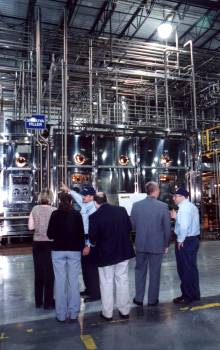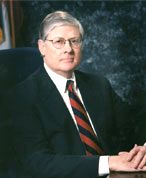|
Triples Size of Pennsylvania Plant
ASPERS, Pa. – Juiced up by its success in the U.S. market, Mott's has completed a US$53-million expansion that's tripled the size of its Aspers, Pa., plant. The investment will add 146 new jobs over the next year at the plant in rural south-central Pennsylvania, where a 400-employee work force was in place prior to the expansion.
Already Mott's largest U.S. production operation, the Aspers plant has been enlarged to span 400,000 sq. ft. (31,160 sq. m.). The expansion added new distribution space, an additional manufacturing line for Mott's Apple Juice and its other drinks, and a new manufacturing line for the company's Yoo-Hoo Chocolate Drink.
"With the addition of the new manufacturing lines, we are able to satisfy the increased demand for our products," Mott's President Brad Irwin said at the ribbon-cutting for the newly enlarged operation. "We are also able to produce items that weren't previously made in Aspers."
The new volume and product added in the Aspers operation comes in response to the strong U.S. performance of Mott's products, which has run counter to the somewhat weakened American beverage market. Mott's 2002 volume of U.S. juice sales is up 17 percent from a year ago.
|
Buys 10% of Pennsylvania's Apples
"By increasing the size of our distribution center, we are able to significantly decrease the amount of tractor-trailer traffic on local roads, as we can now produce, store and ship product all from one location," said Tom Leedy, manager of Mott's Aspers plant.
Even before the expansion, the Aspers facility was a production-volume powerhouse for Mott's, a division of London-based Cadbury Schweppes. Located amid the region's large cluster of apple orchards, the Aspers plant already purchases nearly 10 percent of Pennsylvania's annual apple crop.
This, unavoidably, was an expansion project that came with a strong potential subplot attached. That subplot traced 51 miles (82.1 kilometers) northeast from Aspers, to Hershey, Pa., home to Hershey Foods Corp. - truly one of the apples of Pennsylvania's economic eye.
As the expanded Aspers plant's celebratory ribbon was being cut, Hershey Foods' future was possibly melting into that of Cadbury Schweppes, the corporate parent of Mott's. The Hershey Trust Co., which controls 77 percent of Hershey Foods' voting shares, has been exploring the company's possible sale since June. Among the rumored hottest suitors: none other than Cadbury Schweppes, along with other players that include Kraft Foods, Nestle and PepsiCo Inc. Speculation ran high, then, when Cadbury Schweppes COO John Brock traveled from London for the Aspers facility's ribbon-cutting.
Brock, however, told Harrisburg, Pa.'s Patriot-News that he wasn't going to tour Hershey's operations during his brief visit. In contrast, five other potential buyers reportedly toured Hershey's plants in late August and early September.
Fischer brought the legal action, he explained, because of concerns that a speedy sale of Hershey Foods would preclude a state review of the purchase. That, in turn, could lead to huge layoffs in Hershey, where the world's No. 1 candy-maker employs 6,200, Fischer explained. "We need to step back and take a hard look at how a sale of Hershey Foods would affect the Hershey community," the attorney general maintained. "There is no reason for the trust and its board to rush out and sell this company without allowing me to represent the public's interest and allowing the court to determine how a sale could hurt this community."
At press time, the legal struggle over the restraining order was still playing out.
Simultaneously, Fisher is venturing into what many legal analysts consider uncharted territory. The attorney general is proposing a change to the state's charitable trusts law. That change would allow corporate trustees to consider a community's interests before selling a for-profit company's controlling stake.
Hershey Trust President and CEO Richard Vowler, however, said that the trust hasn't definitely decided to sell Hershey Foods. The trust hopes to review bids to buy the company at its next board meeting on Sept. 18.
While all those legal wheels were turning, Cadbury Schweppes' newly expanded plant in Aspers was focused on something far simpler: busily turning out more product.
Milwaukee Plant after $888M European Buy
BROOMFIELD, Colo. and MILWAUKEE – Ball Corp., a major player in metal and plastic packaging, has been busily wrapping up expansions on two continents.
|
First, the Broomfield, Colo.-based company shelled out some $883 million - in cash - to acquire Germany's Schmalbach-Lubeca, Europe's second-largest manufacturer of beverage containers. Four days later, Ball announced a $43 million stateside investment: The company is adding a new, high-speed food can line and 225,000 sq. ft. (20,903 sq. m.) of new warehousing space at its existing metal beverage container plant in Milwaukee.
"The new line will increase Ball's two-piece food can capacity and will complement our existing two-piece food can lines in our plants in Findlay, Ohio, and Whitby, Ontario (Canada)," said Leon Midgett, chief operating officer of Ball's packaging operations. "The three locations will enable us to more efficiently supply our Midwestern food can customers."
The Wisconsin expansion is unrelated to Ball's buy of Schmalbach-Lubeca, which won't secure all regulatory approvals until late 2002 or early 2003, according to company officials.
Instead, the catalyst for the Milwaukee expansion is a new long-term supply agreement that Ball has just signed with Abbott Laboratories' Ross Products Division. Under the terms of the agreement, Ball will supply two-piece metal food cans to Abbott. Abbot, in turn, is exiting part of its operations that manufacture metal containers for the company's own use.
Ball's Milwaukee plant, which currently spans 280,000 sq. ft. (26,012 sq. m.), was initially built as part of Miller Brewing's Can Division. Ball bought the facility in August of 1998. Ball Corp. also owns Ball Aerospace & Technologies Corp. The company's packaging segment, however, remains its economic engine, generating $3.3 billion of the company's total 2001 sales of $3.7 billion.
MEBANE, N.C. – Ford Motor Co. has picked Mebane, N.C., as the latest location in the automaker's fast-track expansion of its U.S. parts distribution network.
|
Ford is leasing 225,000 sq. ft. (20,902.5 sq. m.) in the North Carolina Industrial Center, a new 600-acre (242.8-hectare) mixed-use park owned and developed by Greensboro, N.C.-based Samet Corp. The new operation in Mebane, part of the Winston-Salem/Greensboro, N.C., metro, will be one of Ford's "high-velocity centers" (HVCs).
HVCs concentrate high-volume parts in locations that are close to dealers, a strategy designed to improve parts availability and dealer inventory. Items distributed by the HVCs - such as filters and spark plugs - account for more than 80 percent of dealers' needs for customer repairs, according to Ford officials.
Centers, Emphasizing Daily Delivery
The HVC operation in Mebane will employ 50 workers. Most of the employees will be transfers from existing Ford operations, officials with the automaker said.
The HVC project, said Commerce Secretary Jim Fain, "signifies a new level in North Carolina's relationship with Ford."
A wide range of private- and public-sector organizations "worked diligently with Ford to make this announcement a reality," said Sonny Wilburn, president of the Alamance County Area Chamber of Commerce. That team included Alamance County, the Alamance Chamber's Economic Development Committee, the city of Mebane, the North Carolina Dept. of Commerce, and the Samet Corp., Wilburn explained.

Located east of Greensboro, Mebane is one 10 U.S. locations that Ford has recently tapped for its fast-growing U.S. parts distribution network. Other cities in which the automaker has either opened new centers or will open them before the end of 2002 include: Denver; Fort Worth, Texas; Houston; Manteca, Calif. (part of the Sacramento metro); Memphis; Ontario, Calif.; Phoenix; and Portland, Ore.
Ford has also tapped Davenport, Fla., as the site of a new parts distribution center that will open in April of 2003.
The Mebane center is scheduled to open in July of 2003.
 PLEASE VISIT OUR SPONSOR • CLICK ABOVE
PLEASE VISIT OUR SPONSOR • CLICK ABOVE 
©2002 Conway Data, Inc. All rights reserved. Data is from many sources and is not warranted to be accurate or current.



